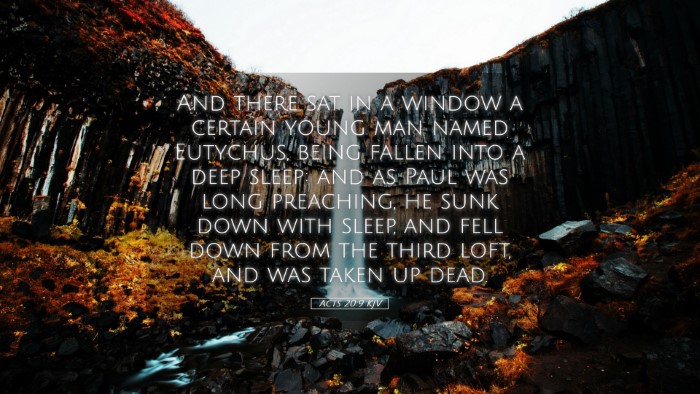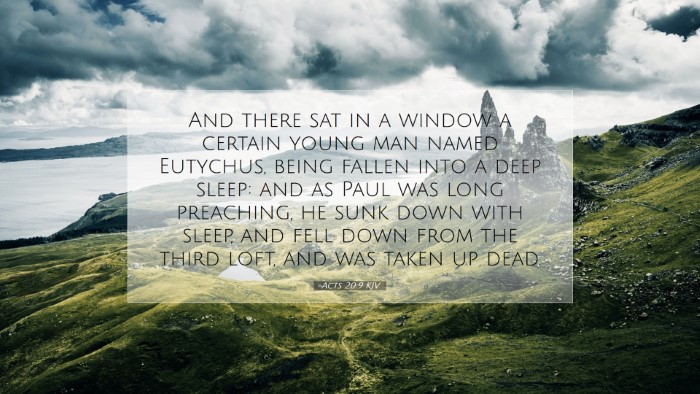Commentary on Acts 20:9
Verse: Acts 20:9 - "And there sat in a window a certain young man named Eutychus, being fallen into a deep sleep: and as Paul was long preaching, he sunk down with sleep, and fell down from the third loft, and was taken up dead."
Introduction
This passage presents a powerful narrative filled with both tragic and redemptive themes. It highlights the dangers of distraction and fatigue in the pursuit of spiritual growth, while also showcasing the mercies of God in restoring life where there was death. The insights from prominent public domain commentaries will be intertwined to provide a comprehensive understanding of Acts 20:9.
Context Analysis
Acts 20 provides an account of Paul’s farewell address to the Ephesian elders. His long discourse was characterized by deep theological insights and pastoral wisdom. The setting is significant; Paul is preparing to leave and desires to equip the church with sound doctrine and faithful leadership.
Historical Context
The events take place during Paul’s third missionary journey, where he was passionately preaching in various cities. His long hours of speaking reflect his dedication to imparting truth, but it also serves as a background to the incident involving Eutychus.
Eutychus: The Young Man in the Window
The story of Eutychus serves as a poignant reminder of the human condition when faced with the demands of spiritual engagement.
Physical State
Albert Barnes remarks on the physical position of Eutychus, noting that sitting in a window symbolizes a precarious state. The window acts as a barrier between the outside world and the spiritual gathering.
Spiritual Symbolism
Matthew Henry comments that Eutychus’s literal fall parallels a spiritual decline. His fall into sleep can be interpreted as a metaphor for the spiritual lethargy that can afflict believers when they neglect the pursuit of God's Word. The window signifies a divide between complacent engagement and active participation in the gathering of believers.
The Implications of Sleep
This episode offers profound implications regarding the church and the believer's state:
- Distraction: Adam Clarke notes that distractions often accompany feasting on the Word. Eutychus’s sleep can reflect the apathy that settles in when one becomes too comfortable.
- Commitment: The incident illustrates the need for commitment in attending to the Word. Paul’s long preaching was meant to stir hearts, not to lull them into sleep.
- Awareness: There is a call to remain vigilant. Admonishing through Scripture, the church is encouraged to keep awake and actively engage with teachings.
The Fall and Its Aftermath
When Eutychus fell, he was taken up as dead. This moment represents not only physical collapse but also physical death, which can metaphorically indicate apostasy or disconnect from God. The gravity of the situation is evident, and it raises questions about the consequences of neglecting spiritual disciplines.
God's Response
In response to this tragedy, Paul descends and resurrects Eutychus. Albert Barnes emphasizes the significance of God’s intervention in this moment. The act of resurrection symbolizes hope and restoration, underscoring that even in moments of failure, through divine grace, revival is possible.
Lessons for Believers
This account emphasizes several critical lessons for believers today:
- Prioritize Spiritual Health: The narrative urges believers and leaders to create environments conducive to spiritual awakening and vigilance.
- Embrace the Word: The importance of engaging with the Word of God to avoid spiritual lethargy cannot be overstated.
- Restoration is Possible: Just as Eutychus was restored, believers are reminded that spiritual revival and restoration through Christ is attainable.
Theological Reflections
This passage ultimately culminates in theological reflections regarding the nature of God’s grace and the community of the Church.
God's Merciful Character
The merciful act of reviving Eutychus is a testament to God’s willingness to restore the fallen. The community’s response to the incident also reflects the communal nature of the church—emphasizing that each member's wellbeing affects the body as a whole.
Community and Responsibility
In light of this incident, there is a call for mutual responsibility among believers. Paul’s attentiveness to Eutychus demonstrates the need for leaders to shepherd their flocks vigorously, ensuring that no one slips into spiritual slumber.
Conclusion
Acts 20:9 serves as a rich text filled with lessons relevant to the church today. From Eutychus's example, we learn about the dangers associated with spiritual lethargy, while Paul’s intervention highlights God’s redemptive power. Thus, as pastors, students, and scholars engage with this text, may they be inspired to cultivate a community committed to the life-giving Word of God, ever alert to the spiritual risks of the environment around them.


